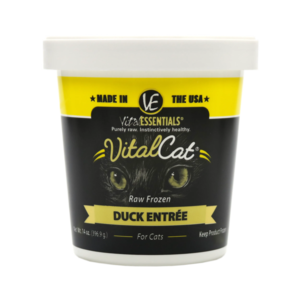Vital Essentials VitalCat Frozen Duck Entree For Cats Review
PawDiet has been helping pet owners since 2015. To fund our efforts, articles may include affiliate links; if you buy something through a link, we may earn a commission.
Review of Vital Essentials VitalCat Frozen Duck Entree For Cats
According to our data, this Vital Essentials recipe provides complete & balanced nutrition for all life stages. In other words, this formula is AAFCO approved.
Vital Essentials VitalCat Frozen Duck Entree For Cats is formulated to meet the nutritional levels established by the AAFCO Cat Food Nutrient Profiles for all life stages.
Review of Ingredients
In our review of Vital Essentials VitalCat Frozen Duck Entree For Cats, we'll examine all 7 ingredients and highlight the nutritional contribution of each ingredient.
While the first few ingredients typically dominate the recipe's composition, ingredients in small quantities can still have a meaningful impact on the overall nutritional profile of the recipe.
Duck is an excellent source of lean, easily-digestible protein and contains essential amino acids that your cat requires.
Duck liver is a highly nutritious organ meat that provides a rich source of vitamins A, B, and iron, which are essential for your cat's overall health, immune system, and energy levels.
Duck Gizzards are a nutrient-dense organ meat that provides a high-quality source of protein, as well as essential vitamins and minerals like iron, zinc, and B vitamins. These nutrients contribute to your cat's overall health, supporting muscle development, immune function, and energy production.
Duck Heart is a nutrient-rich organ meat that provides essential amino acids, vitamins, and minerals to support your cat's muscle development, immune function, and overall well-being.
Goat Milk is a nutrient-rich and easily digestible source of protein, vitamins, and minerals that can help support your cat's overall health and well-being.
Herring oil is a natural source of omega-3 fatty acids, which help support healthy skin, coat, and immune system in cats.
D-Alpha Tocopherol is a natural form of vitamin E, which is an essential antioxidant that helps protect your cat's cells from damage and supports overall health and well-being.
Review of Guaranteed Analysis
Crude Protein (min) of 13.00%: This value represents the minimum percentage of protein in the pet food. In this VitalCat Frozen Duck Entree, the crude protein content is mainly contributed by the primary ingredient, duck, which is a high-quality source of animal protein. Additionally, duck liver, duck gizzard, and duck heart are also rich in protein. These ingredients not only provide essential amino acids necessary for the health of cats but also contribute to the overall protein content of the food.
Crude Fat (min) of 8.00%: The crude fat content is indicative of the amount of fats and oils in the pet food. The duck, which is naturally a fatty bird, along with duck liver and duck heart, are likely the main contributors to the fat content in this product. Herring oil is another significant contributor to the fat content, providing essential fatty acids that are beneficial for a cat's skin and coat health. These ingredients ensure that the product meets the minimum fat requirements for a cat's diet.
Crude Fiber (max) of 1.00%: Crude fiber represents the indigestible portion of plant material in the pet food, which aids in the digestive process. Since the ingredients listed are predominantly animal-based and low in fiber, the crude fiber content is very low. This is typical for cat food, as cats are obligate carnivores and do not require a high fiber diet. The maximum crude fiber content of 1.00% suggests that the product is focused on providing protein and fat rather than plant-based ingredients.
Calories of 1463.00 per kg: The calorie content gives an idea of the energy provided by the food. The high-calorie count is primarily due to the fat content from the duck and herring oil, as fats are more calorie-dense than proteins or carbohydrates. Since cats require a diet that is high in protein and fat, this calorie content is suitable for their energy needs. The calorie density ensures that even small portions of the food will provide a sufficient amount of energy for a cat's daily activities.

